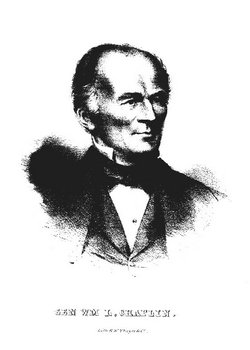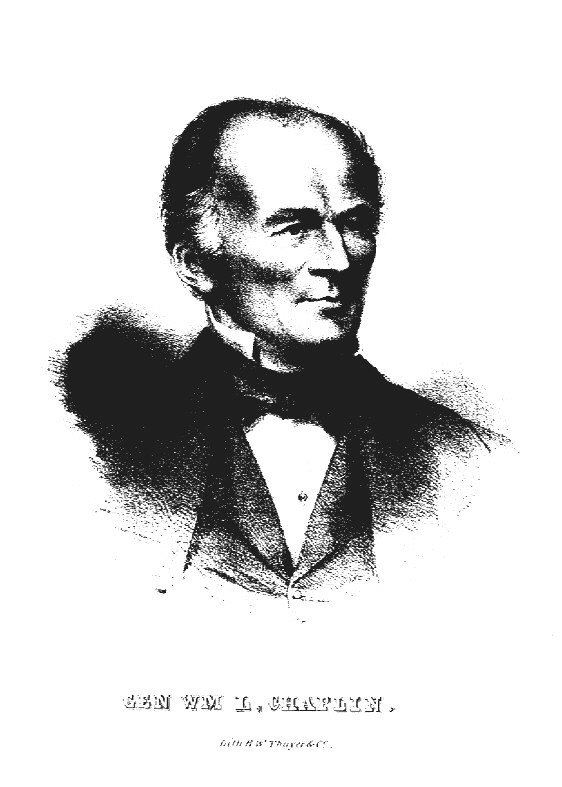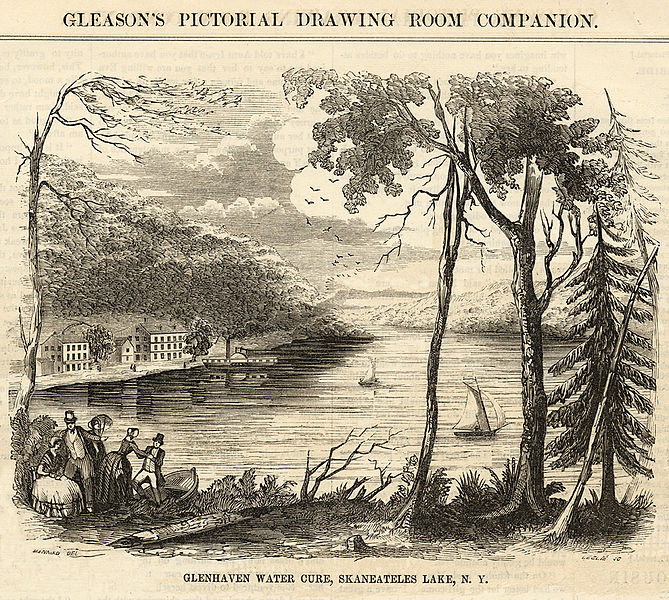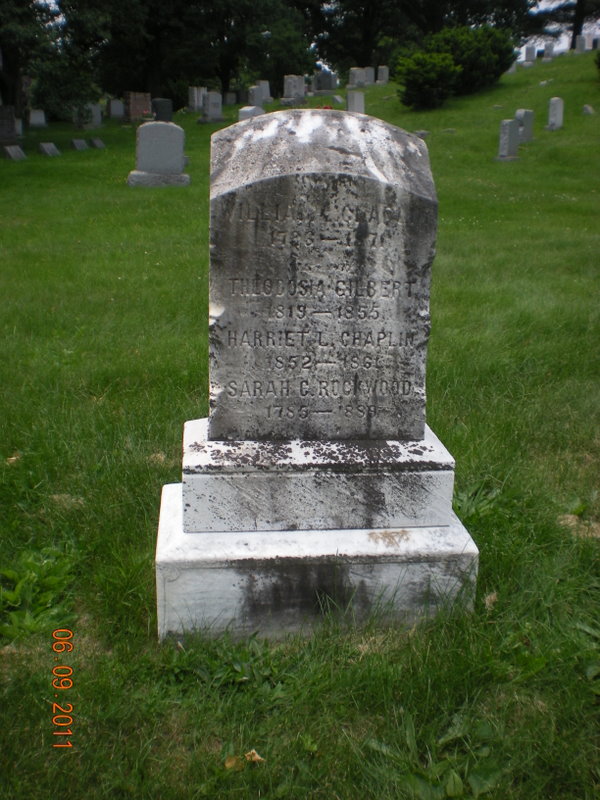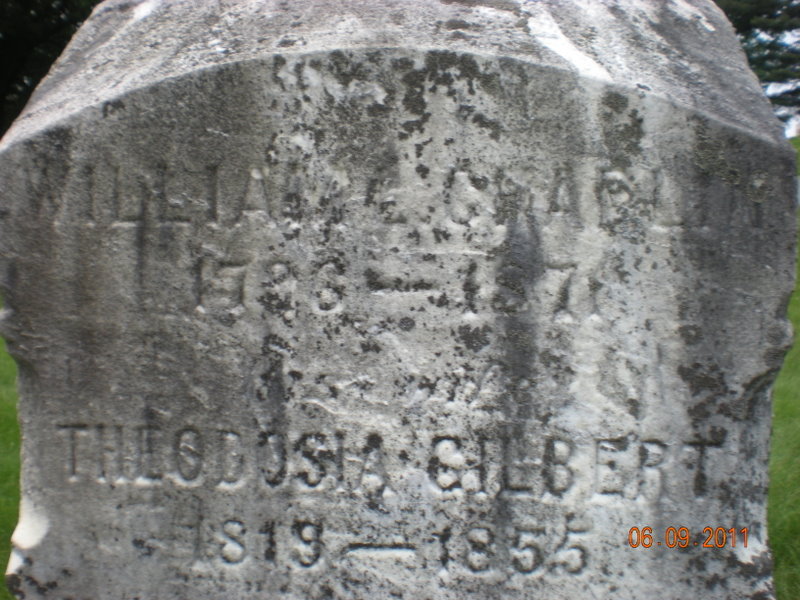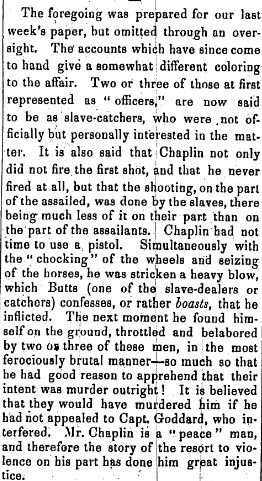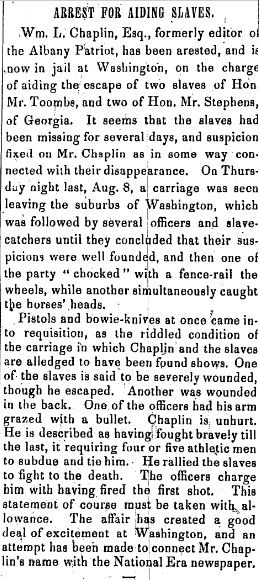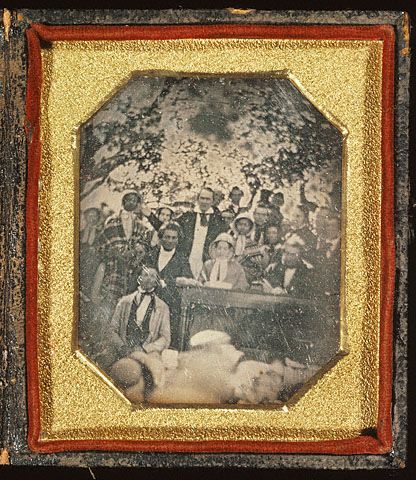In 1850, he was the Liberty Party nomination for governor of New York.
On August 8, 1850, he was arrested when driving a carriage carrying two slaves attempting to escape; one slave belonged to Senator Robert Toombs of Georgia, and another belonged to Senator Alexander H. Stephens of Georgia.
On August 21st and 22nd, 1850, a convention was held in Cazenovia, NY, organized by Frederick Douglass and Gerrit Smith to protest Congressional debate on the proposed Fugitive Slave Act of 1850. Attended by at least 2,000, the crowd included more than 50 fugitive slaves. A daguerreotype taken by Ezra Greenleaf Weld at the event was meant to be sent to William Chaplin, who was in prison in Washington, D.C., for aiding fugitive slaves.
The Columbian, Skaneateles, NY (1851-1853), recorded his marriage: MARRIED – At Glenhaven Water Cure, on the 12th inst., Gen. William L. Chaplin to Miss Theodosia Gilbert.
The New York Herald of Monday, May 15, 1871, recorded his death: RUNNING NOTES – POLITICAL AND GENERAL - General William L. Chaplin, formerly well known as a leader in anti-slavery and temperance reform died at his residence in Cortland, on the 28th of April, aged seventy-six years.
"As I am a living man, I believe that one hundred men like Charles T. Torrey, in courage and devotion to his object, would do more to deliver the slave speedily, than all our paper resolutions, windy speeches, presses and votes into the bargain." - William L. Chaplin
Sources:
The Case of William L. Chaplin; Being an Appeal to all Respecters of Law and Justice, Against the Cruel and Oppressive Treatment to Which, Under Color of Legal Proceedings, He Has Been Subjected, in the District of Columbia and the State of Maryland; 1851
Article in The Post Standard by Alaina Potrikus, August 15, 2010
Gerrit Smith Estate National Historic Landmark
ancestry.com, compiled by Daniel H. Weiskotten
Historical Marker Database
******
Cortland County Standard, 1871
Death of Gen. W. L. CHAPLIN
Gen. William Lawrence CHAPLIN died at his residence in this village on the 28th day of April last, at the age of 76 years. His birth-place was Groton, Middlesex Co., and State of Massachusetts. He was educated at Harvard University, and many distinguished men were his contemporaries in that institution. He was bred to the profession of the law, and commenced practice in his native town. In 1836 he was invited by the American Anti-Slavery Society to enter the field as a lecturer. Being an enthusiastic, bold, and uncompromising foe to oppression in every form, he engaged in the work with a vigor and ability that gave him distinction throughout the Northern States. In 1837 he was advanced to the position of General Agent of the Society for the State of New York, and for four years his tongue and pen were devoted to the noble cause with signal effect. In 1850 he was nominated by the Liberty party as a candidate for the office of Governor of this State, and received a full vote of that noble body of men who were then struggling in the heaven-born cause of freedom, which has finally triumphed and rendered illustrious the names of its early defenders.
Gen. CHAPLIN lived to witness the crowning glory of his labors in the raising of a whole race from crushing bondage to the light of freedom and civilization.
In 1851, he married Theodocia GILBERT, a lady of rare beauty of mind and character. She was intensely devoted to the cause that lay so deep in the heart of Gen. CHAPLIN. She seconded all his efforts with her best energies, and exhibited in her short career the exalted virtues of a philanthropist . She died in 1855, leaving two children, one only now living, a daughter sixteen years of age.
In recent years, the General espoused the cause of temperance with all the ardor of his nature, and soon became its distinguished advocate. In this field of labor he encountered unabated hostility, but it did not abate his purpose or weaken his courage. He felt that "man's inhumanity to man was making countless thousands mourn." He felt a religious necessity resting upon him to resist the frightful ruin that intemperance was spreading over the land. He stood continually on the outposts of reform. His life was devoted to the amelioration and elevation of his fellow man. He was a professor of religion, and a member of the Congregational Church. And the great end of his life was the service of God and his Country. He has left a name honorable among men, and a rich legacy to his kindred. In private life, all who knew him will cherish a grateful remembrance of his dignified, cultivated and genial manner. His duties as a husband and a father were affectionately and faithfully fulfilled. His home was the scene where his virtues shone with undiminished lustre. There the sundering of domestic ties will be keenly felt. His aged and only surviving sister, a lady of rare accomplishments, had turned to him as her natural protector in life's cold decline, and to her his absence is irreparable.
But grief is assuaged in the belief that he has now exchanged the toils of earth for the rest and joys of the redeemed.
Birth month/day, middle name, and parent links provided by Denise
In 1850, he was the Liberty Party nomination for governor of New York.
On August 8, 1850, he was arrested when driving a carriage carrying two slaves attempting to escape; one slave belonged to Senator Robert Toombs of Georgia, and another belonged to Senator Alexander H. Stephens of Georgia.
On August 21st and 22nd, 1850, a convention was held in Cazenovia, NY, organized by Frederick Douglass and Gerrit Smith to protest Congressional debate on the proposed Fugitive Slave Act of 1850. Attended by at least 2,000, the crowd included more than 50 fugitive slaves. A daguerreotype taken by Ezra Greenleaf Weld at the event was meant to be sent to William Chaplin, who was in prison in Washington, D.C., for aiding fugitive slaves.
The Columbian, Skaneateles, NY (1851-1853), recorded his marriage: MARRIED – At Glenhaven Water Cure, on the 12th inst., Gen. William L. Chaplin to Miss Theodosia Gilbert.
The New York Herald of Monday, May 15, 1871, recorded his death: RUNNING NOTES – POLITICAL AND GENERAL - General William L. Chaplin, formerly well known as a leader in anti-slavery and temperance reform died at his residence in Cortland, on the 28th of April, aged seventy-six years.
"As I am a living man, I believe that one hundred men like Charles T. Torrey, in courage and devotion to his object, would do more to deliver the slave speedily, than all our paper resolutions, windy speeches, presses and votes into the bargain." - William L. Chaplin
Sources:
The Case of William L. Chaplin; Being an Appeal to all Respecters of Law and Justice, Against the Cruel and Oppressive Treatment to Which, Under Color of Legal Proceedings, He Has Been Subjected, in the District of Columbia and the State of Maryland; 1851
Article in The Post Standard by Alaina Potrikus, August 15, 2010
Gerrit Smith Estate National Historic Landmark
ancestry.com, compiled by Daniel H. Weiskotten
Historical Marker Database
******
Cortland County Standard, 1871
Death of Gen. W. L. CHAPLIN
Gen. William Lawrence CHAPLIN died at his residence in this village on the 28th day of April last, at the age of 76 years. His birth-place was Groton, Middlesex Co., and State of Massachusetts. He was educated at Harvard University, and many distinguished men were his contemporaries in that institution. He was bred to the profession of the law, and commenced practice in his native town. In 1836 he was invited by the American Anti-Slavery Society to enter the field as a lecturer. Being an enthusiastic, bold, and uncompromising foe to oppression in every form, he engaged in the work with a vigor and ability that gave him distinction throughout the Northern States. In 1837 he was advanced to the position of General Agent of the Society for the State of New York, and for four years his tongue and pen were devoted to the noble cause with signal effect. In 1850 he was nominated by the Liberty party as a candidate for the office of Governor of this State, and received a full vote of that noble body of men who were then struggling in the heaven-born cause of freedom, which has finally triumphed and rendered illustrious the names of its early defenders.
Gen. CHAPLIN lived to witness the crowning glory of his labors in the raising of a whole race from crushing bondage to the light of freedom and civilization.
In 1851, he married Theodocia GILBERT, a lady of rare beauty of mind and character. She was intensely devoted to the cause that lay so deep in the heart of Gen. CHAPLIN. She seconded all his efforts with her best energies, and exhibited in her short career the exalted virtues of a philanthropist . She died in 1855, leaving two children, one only now living, a daughter sixteen years of age.
In recent years, the General espoused the cause of temperance with all the ardor of his nature, and soon became its distinguished advocate. In this field of labor he encountered unabated hostility, but it did not abate his purpose or weaken his courage. He felt that "man's inhumanity to man was making countless thousands mourn." He felt a religious necessity resting upon him to resist the frightful ruin that intemperance was spreading over the land. He stood continually on the outposts of reform. His life was devoted to the amelioration and elevation of his fellow man. He was a professor of religion, and a member of the Congregational Church. And the great end of his life was the service of God and his Country. He has left a name honorable among men, and a rich legacy to his kindred. In private life, all who knew him will cherish a grateful remembrance of his dignified, cultivated and genial manner. His duties as a husband and a father were affectionately and faithfully fulfilled. His home was the scene where his virtues shone with undiminished lustre. There the sundering of domestic ties will be keenly felt. His aged and only surviving sister, a lady of rare accomplishments, had turned to him as her natural protector in life's cold decline, and to her his absence is irreparable.
But grief is assuaged in the belief that he has now exchanged the toils of earth for the rest and joys of the redeemed.
Birth month/day, middle name, and parent links provided by Denise
Inscription
William L. Chaplin
1796-1871
His Wife
Theodosia Gilbert
1819-1855
Harriet L. Chaplin
1852-1861
Sarah C. Rockwood
1785-1889
Family Members
Advertisement
Advertisement
